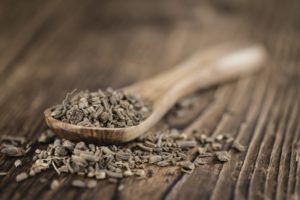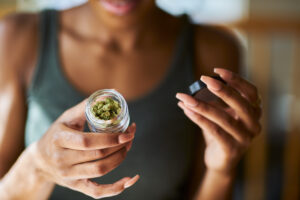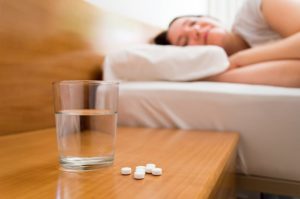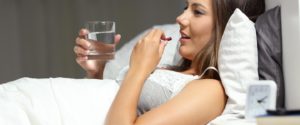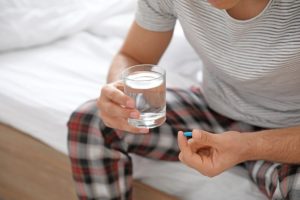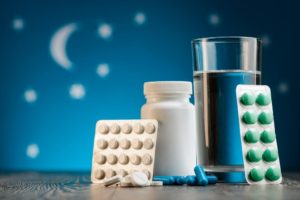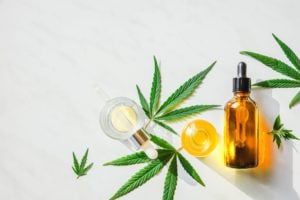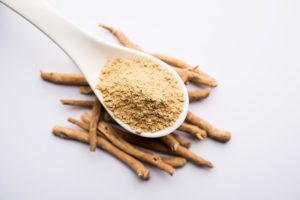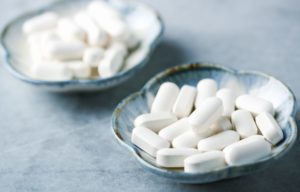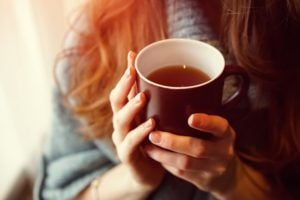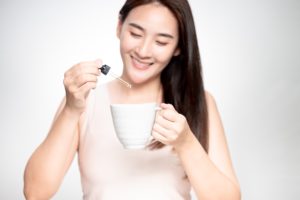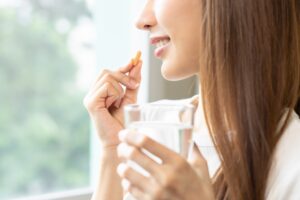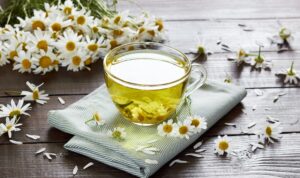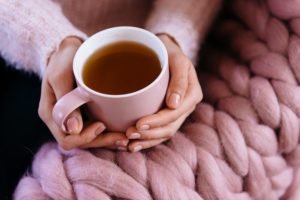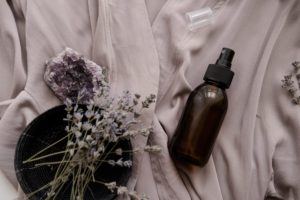When you buy through our links, we may earn a commission. Products or services may be offered by an affiliated entity. Learn more.
Natural Sleep Aids: Which Are the Most Effective?
Natural sleep aids are over-the-counter supplements intended to help you fall asleep faster or stay asleep throughout the night. They are usually plant-based, a vitamin or mineral already present in our diets, or supplemental amounts of something produced by the body. There are not strict guidelines surrounding the use of the word “natural” for supplements, and many natural supplements, such as melatonin, tend to be synthetically derived.
Many people prefer natural sleep supplements because they tend to have fewer side effects than prescription sleep medications. They also appeal to those who prefer natural products, or are concerned about the addictive potential of prescription sleep aids.
Understanding the types of natural sleep aids, their potential benefits and downsides, and how they are regulated can help you make informed decisions about using and purchasing these products.
What Are the Best Natural Sleep Aids?
There is a staggering array of natural sleep aids available, all of which claim to offer the sleep you need. Learning about the evidence supporting different supplements, as well as their potential side effects, can make it easier to decide which natural sleep aid might be best for you.
However, it is important to consult your doctor before starting any new supplement. Natural does not always mean safe for everyone. Many supplements should not be taken by people who have certain allergies or conditions, or those who are taking other medications.
It’s important to know that natural sleep aids are classified as dietary supplements, which means they are not regulated as strictly as medications. As with all dietary supplements, the Food and Drug Administration does not verify the safety, efficacy, or labeling of natural sleep aids.
Melatonin
Melatonin is a sleep-regulating hormone produced by the pineal gland in our brains. It plays a significant role in organizing our circadian rhythms, the 24-hour sleep-wake cycles that govern when we wake up, feel alert, feel tired, and sleep.
A wide range of factors can suppress melatonin production, particularly night-time exposure to light but also aging and some diseases. Since low melatonin levels can cause sleep disturbances, many people take supplemental melatonin, with nearly two thirds of American adults having tried it.
Melatonin might be a good choice for people whose sleep difficulties are associated with:
- Naturally low levels of melatonin
- Jet lag
- Sleep-onset insomnia
- Menopausal night sweats
- Delayed phase disorder and non-24-hour sleep wake disorder
- Autism spectrum disorder (ASD)
- Attention deficit hyperactivity disorder (ADHD)
Melatonin can reduce the effectiveness of some medications and produce unwanted side effects when combined with others. This natural sleep aid may not be recommended for people who have received an organ transplant, experience depression, or have a bleeding or seizure disorder.
Cannabis
As more and more states have legalized medical and recreational cannabis use, people have taken an interest in the sleep-promoting properties of the cannabis plant and its compounds, which are known as cannabinoids. People who use marijuana, a drug created from the cannabis plant, often report that they have an easier time falling asleep. But people do not need to smoke or ingest marijuana to get the sleep benefits of cannabis.
Some natural sleep aids contain natural or synthetic cannabinoids—namely, delta-tetra-hydrocannabinol (THC) and cannabidiol (CBD). Some studies suggest that THC and CBD, alone or in combination, help some people fall asleep, stay asleep, and enjoy higher quality sleep.
Natural sleep aids containing cannabinoids may be beneficial for people experiencing sleep difficulties due to:
It’s worth noting that marijuana and products containing THC have the potential to create dependence, and withdrawal from them can aggravate sleep problems. Additionally, the effects of cannabinoids vary significantly based on product type and dosage. Cannabinoids have the potential to react with many other medications and should not be combined with sedative medication. Sleep aids containing cannabinoids may not be suitable for people with glaucoma, liver disease, and Parkinson disease.
Magnesium
Magnesium is a mineral that plays an important role in many of the body’s processes, and studies suggest that magnesium levels influence both sleep quality and quantity. Most people get the magnesium they need from their diets. Whole grains, avocados, bananas, nuts, seeds, beans, whole grains, and milk are all rich in magnesium. However, some people choose to fortify their magnesium levels with dietary supplements.
Limited research indicates that older adults with insomnia may benefit from magnesium supplements, which may help reverse the changes in sleep that tend to occur as people age.
Side effects from magnesium supplements are rare when people use them according to instructions. However, some people experience diarrhea from taking magnesium. People with kidney disease should also take magnesium supplements with caution and should talk to their doctor first.
L-Theanine
L-Theanine, an amino acid that naturally occurs in the leaves of tea plants, may be responsible for the calm that many people experience as a result of drinking tea. A small body of research suggests that L-Theanine supplements can reduce stress and anxiety, boost relaxation, and improve sleep.
L-Theanine does not appear to help people fall asleep, but it may enhance sleep quality by reducing the number of times users wake in the night. This means it may be a good choice for people who wake often in the night or have sleep-maintenance insomnia. Studies also suggest L-Theanine curbs the detrimental effects that caffeine has on sleep. Combining L-Theanine with magnesium might enhance its benefits for sleep.
Many sleep aids have the unwanted effect of causing daytime sleepiness, but L-Theanine does not appear to have this effect. Consuming up to 200 mg of L-Theanine per day appears to be safe for most people. This includes children with ADHD, who may experience improvements in both sleep and behavior with a daily dose of L-Theanine.
Glycine
Glycine is an amino acid and neurotransmitter that plays an important role in many body functions, including metabolism, nutrient absorption, disease prevention, and sleep. The human body naturally acquires glycine either by producing it through chemical reactions or by ingesting it through foods like beans, meat, and dairy products.
Recent research has shown that taking a small dose of supplemental glycine before bed may improve sleep quality and reduce daytime sleepiness in people with insomnia symptoms. Evidence suggests that glycine supplements benefit sleep by supporting the circadian rhythms involved in sleep. Specifically, glycine facilitates a slight drop in body temperature—a physical change associated with falling asleep and staying asleep.
Taking up to 30 grams of glycine daily appears to have few, if any, side effects—though sleep benefits are often achieved at doses as low as 3 grams.
Valerian
Valerian is an herbal sleep aid made from the roots and stems of the valerian plant. Limited evidence suggests that taking 300 to 600 milligrams of valerian up to an hour before bedtime can help people fall asleep and improve their sleep quality. That said, in a small percentage of people, valerian produces the opposite effect, causing sleeplessness.
This natural sleep aid may be a good choice for individuals who experience sleep problems during the menopausal transition, as some studies indicate that valerian can reduce menopausal hot flashes and help with menopausal insomnia.
Valerian’s sedative effects can linger, sometimes causing morning drowsiness. People should not drive or operate machinery after taking valerian, and they should not combine valerian with alcohol or sedative medications. Some studies indicate that valerian is more likely than other herbal sleep aids to cause unwanted side effects, including irregular heartbeat, dizziness, upset stomach, and headaches. While rare, there have been documented cases of liver damage associated with valerian.
The safety and efficacy of supplements is not closely monitored by the U.S. Food and Drug Administration (FDA). Shoppers should take additional measures to make sure they are purchasing reputable products.
Are Natural Sleep Aids Safe?
Although many people associate the word “natural” with safety, natural sleep aids can come with risks. There are several important factors to consider before you begin taking a dietary supplement for sleep.
- Interactions with other drugs or supplements: Natural sleep aids and other drugs and medication may alter each other’s effects. Exercise caution when combining natural sleep aids with medication or dietary supplements.
- Contraindications: Natural sleep aids are not recommended for people with certain medical conditions. Additionally, many dietary supplements are not recommended for children, older adults, or people who are pregnant or breastfeeding—as evidence for their safety may be lacking for these vulnerable populations.
- Inaccurate labeling: Studies have shown that the quantity of active ingredients in many natural sleep aids often does not match and sometimes far exceeds what is listed on the label. Look for products with a U.S. Pharmacopeia label and begin with the lowest dose available.
- Overdose potential: Some dietary supplements can be toxic at high doses. Make sure to follow dosage instructions provided on the label or by your doctor. Protect children from accidental overdose by securely storing natural sleep aids.
- Side effects: Some natural sleep aids have side effects that warrant caution. For example, you should avoid taking sleep aids that cause drowsiness if you need to drive or if you have work or home obligations that require alertness.
Ask Your Doctor About Natural Sleep Aids
If you are considering taking a natural sleep aid, talk to a medical professional first. Your doctor can review your existing conditions, medications, family history, and current symptoms in order to help you find the best sleep aid. Your doctor can also advise you when to take the sleep aid and how much to take so that you can get the sleep you need.
Medical Disclaimer: The content on this page should not be taken as medical advice or used as a recommendation for any specific treatment or medication. Always consult your doctor before taking a new medication or changing your current treatment.

Still have questions? Ask our community!
Join our Sleep Care Community — a trusted hub of sleep health professionals, product specialists, and people just like you. Whether you need expert sleep advice for your insomnia or you’re searching for the perfect mattress, we’ve got you covered. Get personalized guidance from the experts who know sleep best.
References
14 Sources
-
American Academy of Sleep Medicine. (2023). AASM Sleep Prioritization Survey, Melatonin Use.
https://aasm.org/wp-content/uploads/2023/06/sleep-prioritization-survey-2023-melatonin.pdf -
A.D.A.M. Medical Encyclopedia. (2023, October 18). Melatonin. MedlinePlus.
https://medlineplus.gov/druginfo/natural/940.html -
Kaul M, Zee PC, Sahni AS. Effects of Cannabinoids on Sleep and their Therapeutic Potential for Sleep Disorders. Neurotherapeutics. 2021;18(1):217-227. doi:10.1007/s13311-021-01013-w
https://pubmed.ncbi.nlm.nih.gov/33580483 -
Arnedt, J. (2024, March). Insomnia in patients with a substance use disorder. In R. Benca & A. Eichler (Ed.). UpToDate.
https://www.uptodate.com/contents/insomnia-in-patients-with-a-substance-use-disorder -
Kuhathasan, N., Dufort, A., MacKillop, J., Gottschalk, R., Minuzzi, L., & Frey, B. N. (2019). The use of cannabinoids for sleep: A critical review on clinical trials. Experimental and Clinical Psychopharmacology, 27(4), 383–401.
https://pubmed.ncbi.nlm.nih.gov/31120284/ -
Babson, K. A., Sottile, J., & Morabito, D. (2017). Cannabis, cannabinoids, and sleep: A review of the literature. Current Psychiatry Reports, 19(4), 23.
https://pubmed.ncbi.nlm.nih.gov/28349316/ -
A.D.A.M. Medical Encyclopedia. (2023, September 9). Cannabidiol (CBD). MedlinePlus.
https://medlineplus.gov/druginfo/natural/1439.html -
Mah, J., & Pitre, T. (2021). Oral magnesium supplementation for insomnia in older adults: a Systematic Review & Meta-Analysis. BMC complementary medicine and therapies, 21(1), 125.
https://pubmed.ncbi.nlm.nih.gov/33865376/ -
A.D.A.M. Medical Encyclopedia. (2023, September 1). Magnesium in diet. MedlinePlus.
https://medlineplus.gov/ency/article/002423.htm -
Rao, T. P., Ozeki, M., & Juneja, L. R. (2015). In search of a safe natural sleep aid. Journal of the American College of Nutrition, 34(5), 436–447.
https://pubmed.ncbi.nlm.nih.gov/25759004/ -
Baba, Y., Takihara, T., & Okamura, N. (2023). Theanine maintains sleep quality in healthy young women by suppressing the increase in caffeine-induced wakefulness after sleep onset. Food & function, 14(15), 7109–7116.
https://pubmed.ncbi.nlm.nih.gov/37458751/ -
Dasdelen, M. F., Er, S., Kaplan, B., Celik, S., Beker, M. C., Orhan, C., Tuzcu, M., Sahin, N., Mamedova, H., Sylla, S., Komorowski, J., Ojalvo, S. P., Sahin, K., & Kilic, E. (2022). A Novel Theanine Complex, Mg-L-Theanine Improves Sleep Quality via Regulating Brain Electrochemical Activity. Frontiers in nutrition, 9, 874254.
https://pubmed.ncbi.nlm.nih.gov/35449538 -
Kawai, N., Sakai, N., Okuro, M., Karakawa, S., Tsuneyoshi, Y., Kawasaki, N., Takeda, T., Bannai, M., & Nishino, S. (2015). The sleep-promoting and hypothermic effects of glycine are mediated by NMDA receptors in the suprachiasmatic nucleus. Neuropsychopharmacology : official publication of the American College of Neuropsychopharmacology, 40(6), 1405–1416.
https://pubmed.ncbi.nlm.nih.gov/25533534 -
Shane-McWhorter, L. (2023, January). Valerian. Merck Manual Professional Version.
https://www.merckmanuals.com/professional/special-subjects/dietary-supplements/valerian





